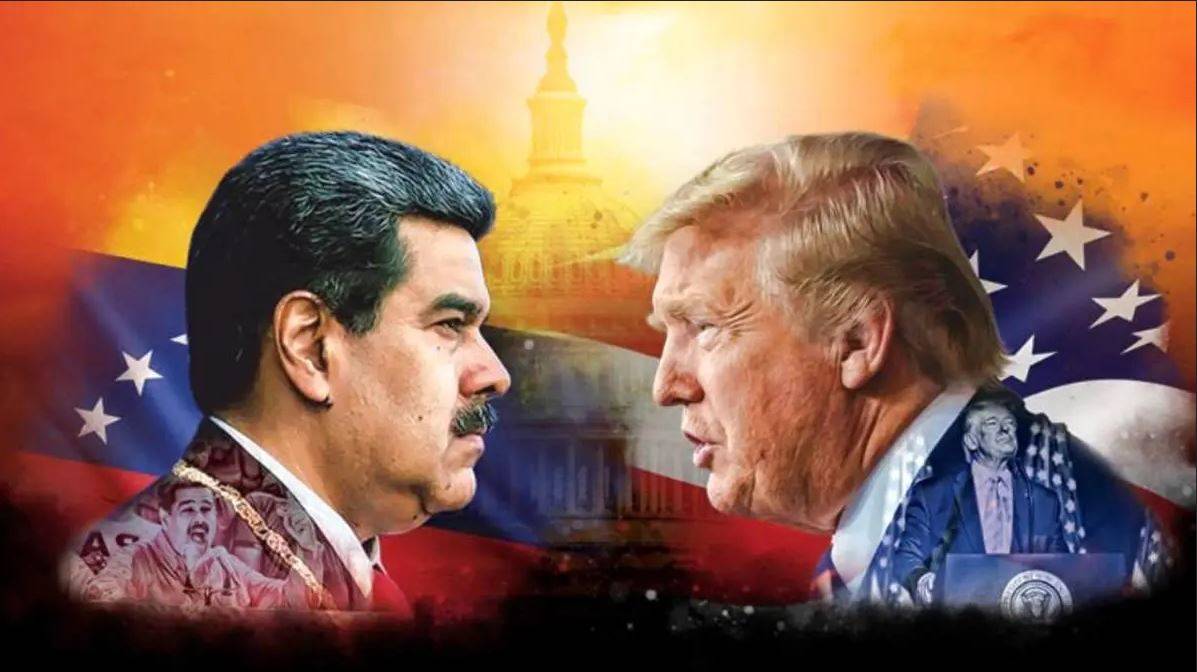305 Views
The Death of American Hegemony: Why Venezuela Has Struck at the Heart of Washington’s Desired Order
The confrontation between the United States and Venezuela is one of the most complex geopolitical crises in the Western Hemisphere. Contrary to what some observers assume, this tension did not begin with Hugo Chávez’s rise to power in 1999; it merely entered a sharper, more confrontational phase. The real roots go back to the nineteenth century and the Monroe Doctrine.
In 1823, James Monroe, the fifth US president, declared that the Western Hemisphere was America’s exclusive sphere of influence and that European powers had no right to intervene. In effect, Washington proclaimed itself the owner of Latin America. Venezuela, because of its strategic position, vast oil reserves, and proximity to the Panama Canal, became one of the first targets of US interference. Over the next two centuries, the United States repeatedly deployed its naval forces, backed proxy dictators such as Juan Vicente Gómez, and treated the country like a manageable outpost.
Yet Venezuelans pushed back. The peak of that resistance came with the 1999 Bolivarian Revolution. Hugo Chávez, and later Nicolás Maduro, pursued anti-US politics, nationalized the oil industry, and built an anti-imperialist bloc with Cuba, Russia, China, and Iran. Venezuela became the symbolic frontline against the Monroe Doctrine.
The roots of the US-Venezuela confrontation fall into several categories:
Ideological factors:
Since 1999, Chávez promoted a model built on nationalization, redistribution, and open confrontation with US imperialism. Washington labeled this approach an authoritarian left-wing populism incompatible with liberal democracy, human rights, and the logic of the free market.
Successive US governments, both Democratic and Republican, likened Venezuela to Cold War–era Cuba or even North Korea. Caracas responded by calling the United States a Yankee empire bent on overthrowing socialist governments, and pointed to Washington’s involvement in events like the failed 2002 coup against Chávez as proof.
Economic factors:
Venezuela possesses over 303 billion barrels of proven crude oil reserves, the largest in the world. US sanctions under Trump’s first administration (starting in 2017 and continuing) devastated the Venezuelan economy. Oil exports collapsed by 93 percent, plunging from 2.2 million barrels per day in 2016 to just 370,000 by 2024.
This economic siege reduced Venezuela’s GDP by 75 percent between 2013 and 2023. Hyperinflation surpassed 1,350,000 percent, and more than 7.9 million Venezuelans migrated. Poverty now affects roughly 96 percent of the population. Government countermeasures failed to offset the impact of sanctions.
Political factors:
The 2018 election marked a major turning point. Maduro won with 68 percent of the vote, but the US and Europe declared the election illegitimate. In January 2019, Juan Guaidó invoked Article 233 of the Constitution to proclaim himself interim president, and Trump, along with more than sixty other countries, recognized him.
Maduro called it a US-led coup, crushed protests, dissolved the National Assembly, and established a parallel Constituent Assembly to consolidate power. As of 2025, only seventeen countries recognize Maduro, and Latin America remains deeply split.
The US repeatedly accuses Maduro and senior officials of involvement in drug trafficking. Reports by the US Drug Enforcement Administration claim that roughly 250 tons of cocaine transit through Venezuela annually to the US and Europe. Venezuela denies these allegations, but independent assessments largely confirm them.
Geopolitical factors:
The presence of Russia and China in what Washington considers its historical backyard directly threatens the Monroe Doctrine. Russia has sold more than twelve billion dollars’ worth of weapons to Venezuela. China has provided over $ 60 billion in loans with oil-for-loan agreements and invested in ports and gold mines.
With Trump’s return to the White House in 2025, tensions escalated to a level unseen in decades. Deployment of a US aircraft carrier, advanced fighter jets, military advisers, and intensified drone operations has effectively militarized the crisis. In response, Venezuela has asked Russia, China, and Iran for military support to prepare for a potential confrontation.
Given the escalating crisis, three main scenarios are now under discussion:
Scenario One: Direct US control over Venezuela
This scenario envisions limited military intervention combined with heavy political engineering to topple Maduro and install a US-backed technocratic or military government. But the risks are enormous: civil war, mass resistance, and possible intervention by Russia or China.
Scenario Two: Permanent consolidation of Maduro with Russian and Chinese backing
Here, Maduro survives through harsh repression, loyalty of the military, and sustained support from his Eastern allies. The economy remains fragile, still functional on inexpensive oil exports. Venezuela becomes a modern-day “Second Cuba.”
Scenario Three: Fragmentation of Venezuela
The worst-case outcome: collapse of central authority, long civil war, and de facto or even formal partition of the country. Various militias, multinational corporations, or neighboring states could take control of the territory in a scenario resembling Yemen or Somalia. Millions more may be displaced, destabilizing all of Latin America.
For now, Scenario Two appears the most plausible. However, the combination of sanctions, mass migration, and weakening military capacity may push Venezuela toward Scenario Three unless a major international settlement is reached.
Ultimately, the US-Venezuela confrontation is not a bilateral feud but a struggle over the future order of the Western Hemisphere. Maduro seeks to undermine the Monroe Doctrine with help from China, Russia, and Iran. The US intends to restore its old dominance. Given the economic collapse, migration crisis, and rising risk of military conflict, this confrontation has become a critical test of American power in the twenty-first century. And with the political deadlock showing no sign of easing, the crisis is nowhere near resolution.
Mohammad Saleh Ghorbani
[1] https://www.cfr.org/backgrounder/monroe-doctrine
[1] https://www.cfr.org/backgrounder/ideological-clash-us-venezuela-relations
[1] https://www.brookings.edu/research/economic-sanctions-on-venezuela-impact-and-implications
[1] https://www.bbc.com/news/world-latin-america-48123456
[1] https://www.dea.gov/documents/2025/06/venezuela-narcotrafficking-report
[1] https://www.foreignaffairs.com/venezuela/geopolitical-rivalries-us-russia-china

Comment
Post a comment for this article